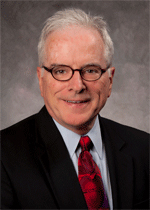By BETSY TAYLOR
Health care management and delivery is stressful under the best of circumstances and the rapid pace of structural and organizational change under way now in U.S. health care is adding a layer of uncertainty that creates even more stress for executives, managers and frontline caregivers.
 Don Eggleston, vice president of mission integration for St. Louis-based SSM Health Care, believes that resilient individuals fare best under such pressure. Resilience, according to Eggleston, is a trait that can be cultivated.
Don Eggleston, vice president of mission integration for St. Louis-based SSM Health Care, believes that resilient individuals fare best under such pressure. Resilience, according to Eggleston, is a trait that can be cultivated.
He offers SSM staff tips to improve their capacity "to bounce back from discouragement, frustration and setbacks without resentment or cynicism" and with greater depth, joy and purpose in a demanding work environment. SSM has been in a time of change, as the Catholic nonprofit, which operates in Missouri, Illinois, Wisconsin and Oklahoma, has reorganized in recent months to better integrate care, but also cut more than 580 positions throughout the system, according to published reports.
Eggleston spoke to Catholic Health World about ways health care professionals can build emotional resilience.
Q. How does one start to build resilience?
A. Pay attention to what is going on inside, to how you are feeling about what is happening to you. Do you feel optimistic and encouraged, or discouraged, frustrated? Is there a realistic source for the feelings you're experiencing? What circumstances or interactions are contributing to your feelings? A person may be upset because they are slow to learn to use electronic health record technology, or they may be having an emotional response to the death of a patient. Next, assess the intensity and duration of the feeling. Is this just a momentary feeling, or something more troubling, where a person feels worthless, or burnt out? For those experiencing a lot of negative self-perception, it is important to turn down the voice of self-criticism. Confiding in a supportive friend can be an antidote to self-nagging doubts.
Who are the people you want to talk to when you've had a rotten day, who won't try to fix you, but who will validate who you are, or help you to see new options? Seek them out. Often, people neglect these relationships when they're stressed out, but they are the best antidote to stress. Rather than bringing work home, take the kids to the park or play with the dog. Ask a friend out to dinner. Cultivate relationships with people who believe in you, but will challenge you in a good sense.
I sometimes worry about senior-level employees feeling isolated, thereby diminishing their own capacity for resiliency. I may suggest senior leaders turn to an outside person, such as a spouse or an executive coach, who can listen and talk with the leader regularly, someone who can hold a confidence and also be forthcoming enough to tell the leader the things he or she needs to hear.
Q. How can people be resilient in a changing work or life environment?
A. It's important to understand the key elements of change and cultivate a sense of personal agency. When a person can envision him- or herself as navigating his or her own life, the person can reframe an issue or concern in a way that generates new options for action; this is hope with a plan.
It also helps to cultivate a spirit of gratitude. Identify something for which you are grateful and reflect on the blessing. The practice has a tremendous impact on well-being. I think gratitude helps you short-circuit resentment. It's a proactive act of resiliency. It's a conscious effort to change unconscious behavior.
Becoming resilient relates to developing an interior life. Prayer or meditation can be a part of this. For those who work in health care, developing a sense of perspective can help prevent burn out.
Q. In a fast-paced health care work environment, how do people take the time to practice techniques to become more resilient?
A. There are ways to incorporate moments for reflection into the day. At SSM hospitals and facilities, employees have brief meetings called "employee huddles." Someone may ask the group to give an example of where they saw an SSM value in action in the workplace in the last few days. Group members can give examples of where they saw the healing presence of God in their work. This question reflects the latter part of SSM's mission statement: Through our exceptional healing services, we reveal the presence of God.
I suggest that health care leaders find something to rejoice in about the organization every day.
Copyright © 2014 by the Catholic Health Association
of the United States
For reprint permission, contact Betty Crosby
or call (314) 253-3477.